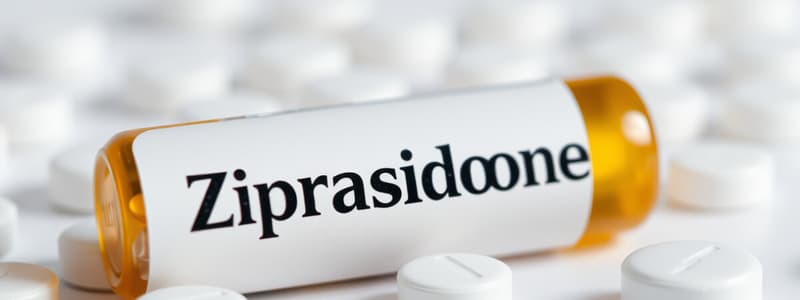Podcast
Questions and Answers
What category class do atypical antipsychotics fall under?
What category class do atypical antipsychotics fall under?
- Atypical antipsychotics
- Mood stabilizers
- Both A and B (correct)
- None of the above
What is the expected pharmacological action of ziprasidone?
What is the expected pharmacological action of ziprasidone?
Effects probably mediated by antagonism of dopamine type 2 (D2) and serotonin type 2 (5-HT2), also antagonizes α2 adrenergic receptors.
What is the therapeutic use of ziprasidone?
What is the therapeutic use of ziprasidone?
Diminished schizophrenic behavior.
Which of the following are contraindications for ziprasidone?
Which of the following are contraindications for ziprasidone?
Which complications may arise from ziprasidone?
Which complications may arise from ziprasidone?
Which of the following may cause life-threatening adverse reactions when used with ziprasidone?
Which of the following may cause life-threatening adverse reactions when used with ziprasidone?
What nursing interventions are important when administering ziprasidone?
What nursing interventions are important when administering ziprasidone?
Flashcards are hidden until you start studying
Study Notes
Ziprasidone Overview
- Ziprasidone (Geodon) belongs to atypical antipsychotics and mood stabilizers.
Pharmacological Action
- Works primarily through antagonism of dopamine type 2 (D2) and serotonin type 2 (5-HT2) receptors.
- Also antagonizes α2 adrenergic receptors.
Therapeutic Uses
- Effective in reducing symptoms associated with schizophrenia.
Contraindications and Precautions
-
Contraindicated in patients with:
- Hypersensitivity or history of QT prolongation (>500 msec).
- Cardiac issues like arrhythmias, recent myocardial infarction, or heart failure.
- Concurrent use with drugs that prolong QT interval (e.g., quinidine, sotalol).
- Conditions like hypokalemia or hypomagnesemia.
- Lactating women (requires discontinuation or alternative feeding).
-
Use cautiously in:
- Patients with diuretic therapy, significant hepatic impairment, or cardiovascular disorders.
- Individuals with orthostatic hypotension risks, history of suicide attempts, or those >65 years elderly.
- Geriatric patients with Alzheimer’s dementia may have increased seizure risk.
Complications (Adverse Reactions)
- CNS: Neuroleptic malignant syndrome, seizures, dizziness, drowsiness, restlessness, extrapyramidal symptoms, syncope.
- Derm: Risk of drug reaction syndrome (DRESS) and Stevens-Johnson syndrome.
- Respiratory: Cough and runny nose.
- Cardiovascular: Prolonged QT interval and orthostatic hypotension.
- Gastrointestinal: Constipation, diarrhea, nausea, dysphagia.
- Genitourinary: Amenorrhea and impotence.
- Hematological: Agranulocytosis, leukopenia, neutropenia.
- Endocrine: Galactorrhea, hyperglycemia, dyslipidemia, weight gain.
- Dermatological: Rash and urticaria.
Drug Interactions
- Avoid concurrent use with QT-prolonging agents to prevent severe adverse reactions.
- Intake with alcohol or CNS depressants can lead to enhanced sedation.
- Effectiveness reduced by carbamazepine; increased by ketoconazole.
Nursing Interventions
- Regularly assess mental status, weight, and BMI throughout treatment.
- Monitor blood pressure and pulse rate, especially during dose adjustments.
- Discontinue medication if QTc exceeds 500 msec.
- Evaluate patients experiencing dizziness or syncope for potential heart issues.
- Monitor for rashes; treat as needed and discontinue if severe with systemic symptoms.
- Observe for akathisia and extrapyramidal side effects bi-monthly during therapy.
- Report severe movement disorders for possible dose adjustment or drug discontinuation.
Studying That Suits You
Use AI to generate personalized quizzes and flashcards to suit your learning preferences.
